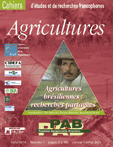Une démarche de conseil pour améliorer la gestion stratégique des périmètres irrigués collectifs du Nordeste (Brésil)
Mots-clés
systèmes agraires, formationRésumé
Les périmètres irrigués collectifs posent des problèmes complexes de gestion, nécessitant des démarches d'intervention adaptées. Cet article présente une approche fondée sur les apports des sciences de gestion. Elle part d'un cadre général de représentation du fonctionnement des périmètres irrigués, mettant l'accent sur deux fonctions centrales : la gestion de l'eau et la tarification du service rendu aux agriculteurs. Elle a été appliquée au périmètre de Maniçoba (région de Petrolina-Juazeiro), caractérisé par une évolution dynamique mais incertaine de son environnement et de ses systèmes de production. Des outils de simulation et un jeu de rôle ont été élaborés pour réfléchir à des scénarios alternatifs concernant l'organisation des interactions offre-demande en eau et le choix de systèmes tarifaires. Les réactions des acteurs aux simulations réalisées sont présentées, de même que les enseignements tirés en termes de validation et de mise en oeuvre de la démarche.Téléchargements
Publié
2005-01-01
Comment citer
De Nys, E. ., Ducrot, R., Le Gal, P.-Y. ., Rocha-Barros, E., Pereira Mouco, C. A. ., & Chohin-Kuper, A. (2005). Une démarche de conseil pour améliorer la gestion stratégique des périmètres irrigués collectifs du Nordeste (Brésil). Cahiers Agricultures, 14(1), 138–143 (1). Consulté à l’adresse https://revues.cirad.fr/index.php/cahiers-agricultures/article/view/30503
Numéro
Rubrique
Articles

